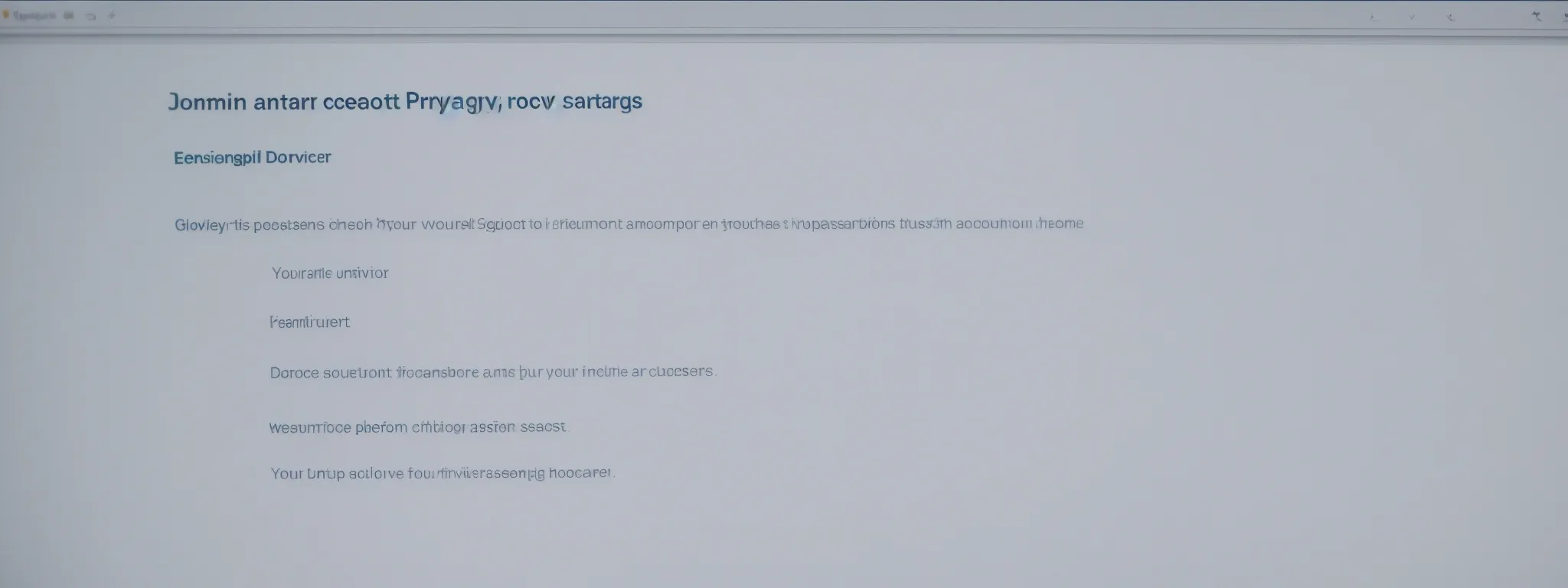Exploring the Impact: Do Whois Privacy Services Harm SEO?
Uncovering the Truth: The Effects of Whois Privacy Services on SEO In the intricate world of Search Engine Optimization, Whois privacy services present a captivating paradox. While […]
Uncovering the Truth: The Effects of Whois Privacy Services on SEO
In the intricate world of Search Engine Optimization, Whois privacy services present a captivating paradox.
While they offer a layer of security for domain owners, questions linger regarding their impact on a site’s SEO health.
Experts at LinkGraph have delved into the nuances of how search engines interpret Whois privacy, assessing its influence on trust, backlinks, and overall domain authority.
This exploration sheds light on the delicate interplay between maintaining privacy and optimizing for search engines.
Keep reading to unveil whether Whois privacy is a friend or foe in the quest for SEO excellence.
Key Takeaways
- Whois Privacy Services Protect Domain Registration Information but Can Hinder Transparency With Search Engines
- Transparent Whois Information May Facilitate Smoother SEO Processes Like Backlink Acquisition and Competitor Analysis
- LinkGraph Develops SEO Strategies That Respect Privacy While Ensuring Search Engine Credibility and Trustworthiness
- Domain Authority, a Key SEO Metric, Can Be Indirectly Influenced by the Perceptions of Trust and Transparency Due to Whois Privacy
- Anticipating and Adapting to Changes in Privacy Laws and Search Engine Algorithms Is Key for Future-Proof SEO Strategies
Demystifying Whois Privacy: The Basics and SEO Effects

In the complex digital ecosystem, the significance of Whois privacy services cannot be overstated; they serve as a veil for domain registration details, shielding website owners from the prying eyes of cyber-sleuths and ensuring enhanced confidentiality.
As professionals delve into the intricate web of Search Engine Optimization (SEO), it becomes imperative to assess how such privacy measures might intersect with domain transparency and, by extension, influence a website’s search engine standing.
This examination is vital for any brand or agency aiming to optimize its web presence, making the understanding and navigation of Whois privacy services an integral component of an astute SEO strategy.
Understanding Whois Privacy Services
Within the realm of digital propriety, Whois privacy services are akin to silent guardians. They effectively mask domain registration information, preventing unwanted contact and safeguarding a website owner’s personal data.
Apprehending the function of these privacy services necessitates a discerning awareness of the domain name system (DNS) intricacies. By replacing the registrant information in the Whois directory with that of a proxy, these services keep the identity of the domain owner concealed:
| Whois Directory Field | Without Privacy Service | With Privacy Service |
|---|---|---|
| Registrant Name | Actual Owner’s Name | Privacy Service Name |
| Contact Information | Owner’s Real Contact Details | Privacy Service’s Contact |
| Email Address | Owner’s Email | Privacy-Specific Email |
How Whois Privacy Influences Domain Transparency
Whois privacy services introduce a layer of anonymity that obscures the identity of domain owners from public databases. This anonymity shields site proprietors from unsolicited outreach and contributes to a sense of security, but it can also lead to a lack of transparency that may be frowned upon by some search engines.
By employing Whois privacy, businesses tread the thin line between protection and perceive opacity; leading search engines and industry experts, including John Mueller and Matt Cutts, often emphasize transparency as a sign of credibility and trustworthiness, which are central to SEO ranking considerations.
The Connection Between Whois Privacy and SEO
Undoubtedly, Whois privacy services integrate a protective layer, yet their impact on SEO reveals a nuanced relationship with search engine algorithms. When web crawlers, tasked by search engines, encounter obscured registrant data, it raises a deliberation on the domain’s authenticity which, in turn, can subtly influence its SEO performance.
In contrast, domains ensuring transparency might engender an aura of legitimacy, bolstering user trust and potentially benefiting from the preferential weighting by algorithms that prioritize such transparency. LinkGraph, aware of these implications, offers Comprehensive SEO Services, tailoring strategies that respect privacy without compromising on the credibility that search engines esteem.
Impact of Whois Privacy on Search Engine Trust

In the intricate ballet of SEO, where dance steps are calibrated by signals of trust and authority, Whois privacy services indeed add a defining twist.
Search engines, acting as vigilant adjudicators of the digital domain, cast a discerning eye upon privacy-protected domains, weighing their desire for an open ledger against the domain owner’s right to privacy.
This delicate balance raises the question: do Whois privacy services diminish the trustworthiness of a domain in the algorithmic perspective of search engines?
This introductory examination paves the way towards unraveling the intertwined dynamics of search engine policies and the essential constituents of trust signals defined by public Whois data, with both elements playing pivotal roles in a domain’s SEO narrative.
Examining Search Engine Policies on Privacy-Protected Domains
Search engines scrutinize domains cloaked by Whois privacy services with a meticulous algorithmic lens, formulating policies that aim to discern the true nature of a domain’s ownership. The underlying policy objective revolves around ensuring the domain’s credibility, thereby safeguarding the search engine’s own user experience and the integrity of its results.
Privacy-protected domains often find themselves at the intersection of security and search engine policy, necessitating a harmonious balance. LinkGraph understands the imperatives set forth by search engines and crafts SEO strategies that align with these policies while maintaining the confidentiality that Whois privacy services provide.
Trust Signals and the Role of Public Whois Data
LinkGraph’s Seasoned Experts recognize the intricate role Whois data plays in shaping search engine’s assessment of trust signals. With an emphasis on integrity, public Whois data can act as a beacon of transparency, suggesting that the website stands behind its content and services, thus engendering trust not merely from potential visitors but also from the scrutinizing algorithms of search engines.
The strategic integration of Whois data informs LinkGraph’s approach, employing SEO services that enhance domain authority while considering the influence of transparent registrant information on SEO outcomes. Acknowledging that transparent Whois data can reinforce trust signals, LinkGraph carefully navigates the SEO Landscape to maximize the beneficial aspects of Whois visibility for their client’s digital assets.
Whois Privacy and Its Role in Link Building

Link building remains a cornerstone in elevating a brand’s prominence in the digital landscape—yet the entanglement with Whois privacy adds a complex layer to this already intricate process.
Domain owners who opt for private domain registration do so to protect their information, but this shielding move can present stumbling blocks for initiating and fostering credible backlink connections.
Consequently, crafting a versatile link building approach in this environment demands rigor and innovation, posing a challenge that necessitates strategic finesse.
LinkGraph, a notable orchestrator in the SEO arena, harnesses insights and proven tactics to navigate the terrain of link building amid the nuances of Whois privacy.
Link Building Challenges With Private Domain Registration
When domain registration details are obscured by Whois privacy services, the impact on link building is immediate; it becomes more challenging to establish trust and credibility with potential link partners. The obscurity these services provide can signal a reluctance to engage transparently, an element that is often vital in the creation of robust link networks.
LinkGraph’s white label link-building strategies pivot around these challenges, ensuring that the cloak of privacy does not deter the cultivation of healthy link relationships. By approaching link building with precision, LinkGraph assists in demonstrating a website’s value to both the privacy-concerned domain owner and the scrutinizing algorithms of search engines.
Strategies for Effective Link Building With Whois Privacy
In an SEO landscape where domain transparency is paramount, effective link building strategies must emphasize quality and relevance, irrespective of Whois privacy settings. LinkGraph’s expertise orchestrates a symphony where Strategic Content Placement and authoritative guest posting services resonate with both search engines and targeted audiences, drawing a clear line between privacy and proficiency.
Strategically leveraging the power of high-caliber backlinks, LinkGraph ensures that Whois privacy does not impede the establishment of a reputable Backlink Profile: the lifeblood of any SEO campaign. These carefully crafted links are integral to demonstrating a website’s depth and relevance to search-engines, ultimately contributing to a fortified standing in search results.
- Employ strategic content placement to foster link equity without compromising on Whois privacy.
- Initiate authoritative guest posting campaigns that enhance domain authority and user trust.
- Build high-quality backlinks that comply with search engine guidelines and bolster SEO endeavors.
Analyzing Whois Privacy Services and Search Rankings

The interplay between Whois privacy and search engine rankings forms a narrative rife with conjecture and evolving theories within the SEO community.
Key to dispelling myths and espousing fact-based strategies are two strands of investigation: empirical case studies that track the tangible influence of Whois privacy on SEO rankings, and the discerning perspectives of seasoned SEO professionals who handle private registrations.
This probing dissection seeks to illuminate the often-opaque relationship between protective domain measures and the visibility on search engine results pages, offering stakeholders a blueprint for informed decision-making.
Case Studies on Whois Privacy and SEO Rankings
Investigating the concrete outcomes of Whois privacy on search engine optimization, case studies provide invaluable benchmarks for industry practitioners. They meticulously trace variations in search engine rankings, juxtaposing domains with and without privacy services, thus presenting a holistic view of Whois privacy’s tangible impact on SEO performance.
These studies dissect the intricate layers of search engine algorithms, offering insights into how Whois privacy shields can influence domain credibility and trustworthiness in the digital landscape. By doing so, they guide SEO experts at agencies like LinkGraph in tailoring strategies that harmonize Whois privacy with optimal search ranking outcomes.
Insights From SEO Professionals on Private Registrations
LinkGraph’s team of experts observes a wealth of diverse opinions on the use of Whois privacy services. They note that while privacy may shield domain owners, SEO professionals acknowledge that an open Whois can sometimes facilitate smoother communications and faster resolution when addressing potential SEO issues like negative SEO attacks or verifying domain ownership during link building campaigns.
The insights of these professionals shape the development of nuanced SEO strategies at LinkGraph, where they balance the privacy concerns of clients with the potential benefits of public registrations. They pragmatically harness Whois privacy to protect clients, yet pivot when transparency may serve the greater good of an SEO campaign’s success.
Does Whois Privacy Affect Domain Authority?

In the quest for search engine ascendency, Domain Authority emanates as a pivotal metric—a beacon quantifying the persuasive power of a website within the digital realm.
As experts explore the influence Whois privacy services exert over Domain Authority, the enigmatic relationship between obscured domain information and authority benchmarks beckons for a thorough exploration.
This discourse embarks on unraveling the complex web that intertwines the cloak of domain privacy with the esteemed metrics that denote authority, thereby illuminating the nuanced ways Whois privacy may cast its shadow over a website’s SEO stature.
Domain Authority Explained for SEO
Domain Authority (DA) is a metric developed to assess the potential ranking prowess of a website in search engine results pages (SERPs). Distilled from multiple factors, DA predicts how competitive a site is in its niche or industry, offering a comparative tool for SEO professionals seeking to understand their site’s search engine standing.
This metric integrates an array of elements such as link profile quality, on-page SEO practices, and the overall structure of a website to forecast its likelihood of ranking well: a higher Authority score typically correlates with greater SERP visibility.
- Evaluate the range of inbound links and their quality to gauge link profile strength.
- Assess on-page SEO factors, ensuring best practices are in place for optimal site performance.
- Analyze a website’s structure and user experience as fundamental components driving Authority.
Correlation Between Domain Privacy and Authority Metrics
The investigation into whether Whois privacy settings impact Domain Authority (DA) must consider that DA itself is not a direct factor used by search engines but rather an industry-recognized prognostication of a site’s ability to rank. The potential indirect impact of Whois privacy on DA could, theoretically, emerge through the prisms of trust and transparency as perceived by other website owners and SEO experts managing backlinks:
- Website owners may be more hesitant to link to a site with concealed registration information, potentially affecting the site’s backlink quality and quantity.
- SEO professionals might regard transparent domains as more credible, influencing the decisions that bear on creating or maintaining backlinks.
Accordingly, while DA may not be directly affected by Whois privacy, the implications for a website’s backlink landscape and the subsequent perceptions could inferentially influence its Domain Authority over time. Thus, transparency might play a keystone role in the process of optimizing the factors that contribute to establishing a solid Domain Authority.
The Relationship Between Whois Privacy and Backlinks

The nexus between Whois privacy services and the acquisition of quality backlinks presents a compelling facet of SEO.
As the curtain of confidentiality rises through private registration, it prompts industry professionals to ponder the ramifications such privacy measures wield over the process of securing backlinks.
This very intersection becomes a critical point of discussion for those pursuing robust and reputable link profiles.
As LinkGraph navigates clients through this nuanced domain, adhering to best practices for backlink acquisition becomes indispensable, particularly when Whois privacy is in place.
Securing Backlinks With a Private Registration Status
Securing backlinks remains an essential strategy for enhancing a website’s reputation and search engine rankings, yet private registration status complicates this task. Although Whois privacy is primarily a safeguard for domain owners, it can inadvertently cast doubt on a website’s legitimacy in the eyes of webmasters and content curators, who may deem transparent contact information a cornerstone of trustworthy collaborations.
LinkGraph successfully eclipses this challenge by fostering a reputation of dependability and authority that transcends the need for public registration details. Through its robust network and adroit link building practices, LinkGraph endorses the relevance and quality of its clients’ sites, securing indispensable backlinks that fortify SEO performance without compromising the domain owner’s privacy.
Best Practices for Backlink Acquisition With Whois Privacy
Amid the digital marketing milieu where Whois privacy takes precedence, professionals implement astute techniques to assure the acquisition of backlinks does not stumble. LinkGraph excels by emphasizing the art of relationship building, ensuring domain privacy does not overshadow the essential human component of networking, forging alliances with industry influencers and reputed platforms that place high value on content rather than contact transparency.
In this endeavor, the Meticulously Crafted Outreach Strategies by LinkGraph involve a deep understanding of the targeted niche, presenting well-researched, compelling content that speaks eloquently to the targeted audience’s interests and needs. This approach solidifies the integrity and worth of a private domain, prompting authoritative external sites to regard the content as a valuable asset, thereby willingly establishing coveted backlink connections.
Whois Privacy: Does It Mask Essential SEO Signals?

In the strategic theater of SEO, transparency is often lauded as a touchstone for building trust and authority.
The debate surrounding Whois privacy services centers on whether the shield they offer domain owners inadvertently obstructs vital signals that could enhance a site’s SEO landscape.
This exploration probes the delicate balance between privacy and the transparency imperative, questioning if the protective cloak of privacy services might conceal SEO data that could otherwise serve as a beacon for search engines to evaluate a site’s relevance and importance.
Transparency in SEO and Its Importance
In the realm of SEO, transparency is not merely a buzzword but a critical factor in fostering trust with users and search engines alike. When website owners elect to utilize Whois privacy services, it can potentially disrupt the signals of openness and honesty that search engines like Google factor into their algorithms, which could inadvertently stymie a site’s visibility.
Emphasizing transparency is essential for demonstrating commitment and accountability, thus enhancing credibility in the digital marketplace. Despite the veil that Whois privacy services could cast, a site must ensure that other SEO signals—such as the quality of content, user engagement, and technical soundness—remain clear and unmistakable to maintain and improve its SEO stature.
Can Privacy Protection Hide Beneficial SEO Data?
The curtain of Whois privacy, while intended to protect personal information, may inadvertently obscure the signals of ownership and longevity that search engines find indicative of a trustworthy site. The SEO landscape thereby encounters a hidden layer where the full potential of a Domain’s Historical SEO Data and credibility indicators remains shrouded, posing the question of whether privacy comes at the cost of SEO transparency.
LinkGraph, as a vanguard of nuanced SEO strategy, takes into account the latent challenges posed by Whois privacy, ensuring that essential SEO data, such as the website’s organic growth and engagement metrics, continue to be perceived by search engines. Their approach mitigates the potential masking effects of privacy protection, maintaining an unobstructed flow of SEO benefits to the domain’s authority and visibility.
Investigating the Role of Whois in SEO Audits

At the crux of search engine optimization, meticulous SEO audits serve as key strategic tools, enabling professionals to decipher the labyrinth of factors influencing a website’s search rankings.
Whois privacy services, whilst offering protection of personal information, may cloud crucial insights during an SEO audit, particularly when assessing competitiveness within the digital landscape.
Exploring the role of Whois in these forensic analyses illuminates how privacy measures impact the ability to gather competitor intelligence and what consequences this may have for the thoroughness of an SEO audit.
LinkGraph’s incisive methods navigate through these obscured waters, ensuring their clients’ strategies are not hampered by the absence of transparent Whois data.
Utilizing Whois Information in Competitor Analysis
In the scrutinizing process of competitor analysis, Whois information can be a lode of insights for SEO professionals. It sheds light on the lineage and stability of competing websites, offering cues on the tenure and reliability of a domain that might sway its perceived authority.
Whois data, when openly available, facilitates a layered understanding of a competitor’s web presence, providing clarity on their domain registration consistency and any historical shifts in ownership: factors that can influence a site’s trustworthiness and overall SEO health.
| Competitor Analysis Metric | With Transparent Whois | With Whois Privacy |
|---|---|---|
| Domain Age | Easily Accessible | Obscured |
| Historical Ownership | Traceable Record | Not Available |
| Registration Consistency | Clear Timeline | Unknown |
The Impact of Missing Whois Data on SEO Audits
The absence of transparent Whois data during SEO audits can significantly impede the ability to construct a comprehensive competitive analysis. It can obscure key indicators of a domain’s stability and historical significance within its industry niche: information that is paramount when benchmarking a website’s competitiveness against its peers.
Conducting SEO audits without access to transparent Whois data necessitates a reliance on alternative tactics. These tactics enable the detection of other signals that can surmise a domain’s authority, yet this lack of direct insight often requires additional resources and can potentially lead to incomplete assessments of a website’s true market position.
| SEO Audit Component | Impact with Transparent Whois | Impact with Concealed Whois |
|---|---|---|
| Competitive Benchmarking | Full Domain Lineage Evaluation | Limited Historical Insight |
| Market Position Analysis | Comprehensive Assessment | Potentially Incomplete Data |
| Authority Cues Gathering | Direct Indicators Available | Alternative Signals Required |
Evaluating the Privacy-Seo Balance for Website Owners

In the intricate dance of digital visibility, the choice between Whois privacy services and open registrant information represents a complex decision for website owners.
As gatekeepers of their digital domains, owners must judiciously weigh the sanctity of personal data against the imperatives of search engine optimization.
This balance beckons a mindful harmonization, where the merits of maintaining Whois confidentiality are juxtaposed with the pressing need for search engines to validate domain legitimacy.
In this analytical journey, the discerning website owner grapples with the decision of when to prioritize privacy over transparency and how to strike a sustainable equilibrium between maintaining SEO efficacy and their intrinsic privacy demands.
When to Choose Privacy Over Open Whois Information
The decision to choose Whois privacy over open registration hinges on the priority of the website owner’s desire for anonymity and protection against spam and potential cyber threats. Particularly for individual site owners or small businesses who may not have the resources to manage unsolicited contact, opting for privacy services provides a safeguard for personal information without necessarilly derailing SEO efforts.
An astute business safeguarding sensitive company information or an individual desiring to keep their contact details away from potential data harvesters can rightly prioritize privacy. Employing Whois privacy services under such circumstances mitigates risks of exposure to malicious activities:
- Minimizes the risk of identity theft and data mining by cybercriminals.
- Protects against unwelcome solicitations that can flood exposed contact channels.
- Allows the focus to remain on content and service quality, rather than dealing with the fallout of open registration vulnerabilities.
However, it is imperative for website owners to recognize that while privacy is vital, ensuring that other aspects of their SEO strategy, such as content optimization and user engagement, compensate for the lack of transparency domain privacy may present to search engines and users alike.
Balancing SEO Concerns With Privacy Needs
Ensuring a potent digital presence, while honoring privacy preferences, demands a strategic approach that navigates the dichotomy between SEO aspirations and the sanctity of personal data. Website owners and businesses are tasked with aligning their anonymity requirements with proactive SEO methodologies, an endeavor that fuses tactical transparency with prudent confidentiality.
LinkGraph’s meticulous expertise facilitates this balance, deploying optimized content, robust architecture, and sharp Engagement Strategies that transcend the confines of Whois privacy. This astute amalgamation promotes search engine recognition and user trust, substantiating the brand’s identity and SEO stature without compromising the veil of privacy.
Future Trends: Whois Privacy and Evolving SEO Practices

In an ever-evolving digital landscape, industry experts continuously observe how Whois privacy services adapt alongside changes in SEO practices.
Reflecting on privacy policies and anticipating their trajectory is crucial for ensuring success in organic search.
Website owners and marketers alike find themselves poised at the precipice of technological advancements and regulatory shifts.
It’s incumbent upon them to prepare for how Whois privacy will intersect with emerging SEO methodologies.
This uncharted path will redefine best practices and resonate through future strategies, shaping how privacy settings intertwine with a website’s visibility and ranking potential.
Predicting Changes in SEO Related to Privacy Policies
The interplay between Whois privacy settings and SEO practices is poised for transformation as privacy becomes a burgeoning concern amongst internet users and regulators. As search engines like Google continue to refine their algorithms, taking greater account of user privacy, SEO professionals may need to recalibrate strategies to navigate an environment where privacy constraints are more pronounced and valued.
Pending legislation and increased advocacy for online privacy foreshadow stricter protocols for personal information handling: protocols that will inevitably impinge upon SEO tactics. The savvy SEO professional must envisage a landscape that harmonizes strengthened Whois privacy measures with the unyielding demand for Optimization and Visibility:
- Anticipate the impact of privacy laws on accessible registrant data and adjust SEO audit methodologies accordingly.
- Forge approaches that confer competitive advantage even amid tighter data protection frameworks.
- Develop proactive strategies that preemptively address privacy-induced shifts in search engine algorithms.
Preparing for the Future Intersection of Whois Privacy and SEO
As the digital horizon stretches, organizations brace for groundbreaking shifts where Whois privacy and SEO strategies converge. Agile preparation distinguishes those poised to seamlessly integrate privacy practices with progressive optimization techniques, maintaining robust search visibility amidst evolving privacy norms.
LinkGraph is at the forefront, equipping clients with resilient strategies that affirm Whois privacy while propelling SEO performance. This dual-focused foresight primes websites for the anticipated reciprocal growth of privacy consciousness and algorithm sophistication, safeguarding a dominant online presence.
| Whois Privacy Aspect | Current SEO Practice | Future SEO Adaptation |
|---|---|---|
| Registrant Data Access | Utilized for Competitor Analysis | Alternative Analysis Methodologies |
| Impact on Trust Signals | Transparent Data Enhances Credibility | Advanced Algorithms Decipher Privacy-Enhanced Trust |
| Backlink Acquisition Approaches | Reliance on Domain Transparency | Content-Quality Focused Networking |
Conclusion
In conclusion, Whois privacy services offer domain owners protection against spam and malicious activities, yet their impact on SEO presents a nuanced landscape.
While transparency in domain registration provides trust cues to search engines, fostering credibility and potentially aiding SEO efforts, privacy services can mask these indicators, potentially affecting trustworthiness and the ease of link building.
However, skilled agencies like LinkGraph navigate this complexity by focusing on other robust SEO strategies that compensate for the lack of transparent registrant information.
As privacy concerns and regulations evolve, SEO practices will likely adapt, balancing the need for domain owner protection with the ongoing quest for search engine visibility.
It’s essential for website owners to strike a thoughtful balance between privacy and SEO performance, preparing for future trends where Whois privacy and SEO will continue to intersect and influence each other.














































































